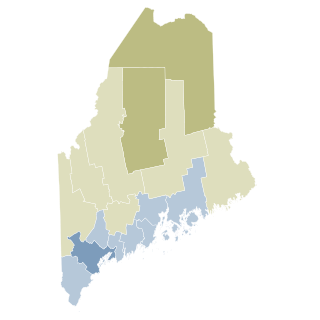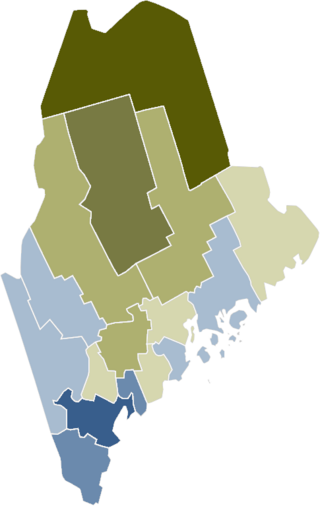Related Research Articles

In political science, an initiative is a means by which a petition signed by a certain number of registered voters can force a government to choose either to enact a law or hold a public vote in the legislature in what is called indirect initiative, or under direct initiative, where the proposition is put to a plebiscite or referendum, in what is called a Popular initiated Referendum or citizen-initiated referendum.
A constitutional amendment is a modification of the constitution of a polity, organization or other type of entity. Amendments are often interwoven into the relevant sections of an existing constitution, directly altering the text. Conversely, they can be appended to the constitution as supplemental additions, thus changing the frame of government without altering the existing text of the document.
In the politics of the United States, the process of initiatives and referendums allow citizens of many U.S. states to place new legislation, or to place legislation that has recently been passed by a legislature on a ballot for a popular vote. Initiatives and referendums, along with recall elections and popular primary elections, are signature reforms of the Progressive Era; they are written into several state constitutions, particularly in the West. It is a form of direct democracy.
Referendums in Taiwan at both the national and local level are governed by the Referendum Act of Taiwan, which was enacted by the Legislative Yuan in December 2003. Citizens can propose laws via referendums at the national and local levels. The Referendum Act also allowed people to make changes or abolish laws by referendums.
Same-sex marriage in Maine has been legally recognized since December 29, 2012. A bill for the legalization of same-sex marriages was approved by voters, 53–47 percent, on November 6, 2012, as Maine, Maryland and Washington became the first U.S. states to legalize same-sex marriage by popular vote. Election results were certified by the Maine Secretary of State's office and the Governor of Maine, Paul LePage, on November 29.

Proposition 7 of 1911 was an amendment of the Constitution of California that introduced, for the first time, the initiative and the optional referendum. Prior to 1911 the only form of direct democracy in California was the compulsory referendum.

A constitutional referendum was held in American Samoa on November 2, 2010, on the same day of the United States House of Representatives election and American Samoan general election.

Maine Question 1 was a voter referendum conducted in Maine in the United States in 2009 that rejected a law legalizing same-sex marriage in the state. The measure passed 53–47% on November 3, 2009.

Maine Question 1 was a voter referendum on an initiated state statute that occurred on November 6, 2012. The referendum was held to determine whether or not to legalize same-sex marriage. The referendum passed with a 53-47% vote legalizing same-sex marriage in Maine.

The Michigan ballot proposals in 2012 included a referendum on a law passed by the Michigan Legislature and five proposed amendments to the Michigan Constitution. All six proposals were defeated.
A referendum is a direct vote in which an entire electorate is asked to either accept or reject a particular proposal. This article summarises referendum laws and practice in various countries.

Maine Question 1 was a people's veto referendum that appeared on the June 12, 2018 statewide ballot. It sought to reject a law passed by the Maine Legislature that suspended the implementation of ranked choice voting, authorized by Maine voters in a previous referendum, for use in Maine elections until and if an amendment to the Maine Constitution is passed to expressly permit it; failing that, the law would be automatically repealed in 2021. It qualified because supporters of the original referendum collected the necessary number of signatures from registered Maine voters. This vote coincided with primary elections in which party nominees for governor, U.S. Senate, U.S. House, and the Maine Legislature were chosen through RCV to run in general elections on November 6.
Maine Question 5, formally An Act to Establish Ranked-Choice Voting, is a citizen-initiated referendum question that qualified for the Maine November 8, 2016 statewide ballot. It was approved by a vote of 52% in favor, 48% opposed. It sought to change how most Maine elections will be conducted from a plurality voting system to a ranked-choice voting system. It appeared on the ballot along with elections for President of the United States, Maine's two U.S. House seats, the legislature, five other ballot questions, and various local elections. The referendum was successful, making Maine the first state to use ranked choice voting for its federal elections.

Maine Question 4, formally An Act to Raise the Minimum Wage, is a citizen-initiated referendum question that appeared on the Maine November 8, 2016 statewide ballot. It sought to increase Maine's minimum wage from $7.50 per hour to $12 an hour by 2020, as well as increasing the minimum wage for tipped employees gradually to the same level by 2024. It would also index increases after 2024 to inflation. As the Maine Legislature and Governor Paul LePage declined to enact the proposal as written, it appeared on the ballot along with elections for President of the United States, Maine's two U.S. House seats, the Legislature, other statewide ballot questions, and various local elections. Efforts to place a competing, more moderate proposal alongside the citizen-initiated bill were unsuccessful.

Maine Question 1, formally An Act to Legalize Marijuana, is a citizen-initiated referendum question that qualified for the Maine November 8, 2016 statewide ballot. It was qualified for the ballot after a Maine Superior Court judge ordered that petitions rejected by the Maine Secretary of State be reconsidered. The proposal sought to legalize the recreational use of marijuana in Maine for those over the age of 21, and institute a 10 percent tax on its sale. As the Maine Legislature and Governor Paul LePage declined to enact the proposal as written, it appeared on the ballot along with elections for President of the United States, Maine's two U.S. House seats, the Legislature, other statewide ballot questions, and various local elections.
A multi-question referendum was held in Taiwan on 24 November 2018 alongside local elections. The referendum was the first since the December 2017 reform to the Referendum Act, which reduced the threshold for submitting questions to the ballot; under the new system, signatures from 1.5 percent of the electorate were required to successfully put a question on the ballot, reduced from 5 percent previously.
A four-question referendum was held in Taiwan on 18 December 2021. The vote was originally scheduled to take place on 28 August 2021, but was postponed to December due to the COVID-19 pandemic. All four questions were popular initiatives. According to the Referendum Act, referendums can be held once every two years on the fourth Saturday of August and questions must gather a number of signatures equivalent to 1.5% of eligible voters (280,000) in order to qualify.

The 2022 Kansas abortion referendum was a rejected legislatively referred constitutional amendment to the Kansas Constitution that appeared on the ballot on August 2, 2022, alongside primary elections for statewide offices, with early voting from July 13. If enacted, the amendment would have declared that the Kansas Constitution does not guarantee a right to abortion, given the Kansas state government power to prosecute individuals involved in abortions, and further declared that the Kansas government is not required to fund abortions.
The following is a list of ballot measures which were on the ballot for the 2022 United States elections. Some were held prior to the federal elections on November 8. Many were initiated by state legislatures, while others were initiated by public petitions.
References
- ↑ "Maine referendum ballot set for November election". 6 August 2021.
- ↑ "Maine voters reject $1B hydropower corridor in massive rebuke to CMP". Bangor Daily News. 2021-11-03. Retrieved 2021-11-03.
- ↑ Praet, Nicolas Van (2021-11-02). "Maine voters reject hydropower line from Canada to New England". The Globe and Mail. Retrieved 2021-11-03.
- ↑ "Secretary Bellows announces question order for November referendum election ballot". 5 August 2021.
- ↑ Telford, Taylor (2021-11-03). "Maine just voted to become the nation's first "right to food" state. What does that mean?". Washington Post . Retrieved 2021-11-03.